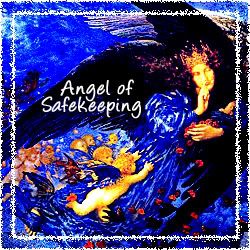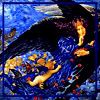
Hughes, Edward Robert:
Night and Her Train of Stars, 1912.
Watercolour, height 755 mm, width 1245 mm,
Birmingham Museums & Art Gallery
Angel of Safekeeping
by Anselm Grün
A German word for “to keep safe/to preserve†is “bewahrenâ€. This derives from Old High German wara and means “attentiveness, heeding, care, custodyâ€. It means that we should take care and deal attentively with everything we experience, with everything we hear, see and understand. Especially in our time of haste we need the Angel of Safekeeping; not in order to cling to the past, but in order not to lose the treasure of what our experiences in the hectic of daily life. In our fast moving time we quickly lose sight of what we have seen. We move from one impression to the next. But that way nothing can grow inside us. We feel riven. We cannot really savour what we have experienced today. Many people are incapable of intensely living the present, to really feel what they are experiencing. Thus they need more and more potent impulses from the outside to be able to feel anything at all.
The early monks developed a method of how to be able to live completely in the present. It was a method of meditation, or how they called it, ruminatio. “Ruminari†means “to chew the cudâ€, “to ruminateâ€. So they took words of the scriptures into their mouths and chewed on them again and again. They repeated them in their hearts, considered them, looked at them anew, gazed at the word from all perspectives. Thus a single word of the scriptures could occupy them for days. Thus the word turned to flesh in them. It transformed them. It kept them grounded amid the turmoil of their spirits and the noise of the world. And it enabled them to be completely in the moment. There was nothing more important for them than to be present in the presence of God.
There is a wonderful saying that compares the way we treat the word with the behaviour of the horse and the camel. The camel makes do with little food, chewing the cud again and again. The horse needs a lot of food, it is always hungry. And Father Antonios admonishes us to treat the word of God not like a horse, but like a camel. We should not voraciously gobble up new things over and over again, but keep the little that we have heard and read in our hearts. Then it can transform us. Then we can live on it. In prison in Tegel Dietrich Bonhoeffer writes how he recalls memories and how they are consolation and light to him in the loneliness of his prison cell. He could keep encounters and experiences during services or concerts in his heart and live on them, in the cold of his time. His ability to hold on to healing words and experiences was an answer to the Hölderlin‘s lamenting question: “Woe me, where do I find the flowers and where the sunshine in wintertime?†He kept the blossoms of his experience with God so that they could flower even in the barren wasteland of brutal Nazi stooges. And he kept the sunshine in his heart so that the cold of reticent people could not be a danger to him.
The Angel of Safekeeping does not want to lead you to a conservative attitude or escapism. He rather wants to guide you to preserving and keeping safe your precious experiences, to hold on to them like a special treasure that you can admire over and over again. This endows your life with depth and wealth. You can persist in situations that are less than auspicious. You can also pass through wastelands without dying of thirst. Who does not have the ability to preserve something, will need new comfort over and over again, new nourishment, new experiences to be able to feel alive at all. The ability for safe-keeping keeps me alive even when I am cut off life, in situations of failure, in situations of paralysis. I wish that you are empowered by the Angel of Safekeeping to live intensely for every moment. He wants to give you the ability of Frederick, the hero of a children’s story, who gathered sunbeams and the colours of flowers in his heart during summer, so he could live on them in wintertime.
© by Anselm Grün, 50 Engel für das Jahr, 1997;
translation by JunoMagic.
Song for December 9:

Göttliches Kind (“Divine Child”)
by Hans-Jürgen Hufeisen,
album “Gold, Weihrauch und Flöte” (“Gold, Incense and Flute”)

This advent calendar is such a wonderful and inspiring idea, Juno! I didn’t really look beneath the cuts until a few days ago, but now I read them everyday and download the enchanting music. Thank you very much for taking the time to translate and post these pieces. I think that we’re too easily distracted by the material aspects of the holiday that we forget that it is meant to be a spiritual event. Having material like this to read and contemplate every day really contributes to the spiritual experience of Christmas. Thank you for them, and sorry for not speaking up earlier (and leeching the music)!
I believe that the end of the year is a good time for taking a quiet moment or two and *think*.
The angels help.
I’m glad you enjoy them and the music!
It is wonderful to do things slowly, and to savor each lovely bite. We seldom get time to do this, but need to do it more. I have taken to reading favorite books this way. I read the Silm, UT, Hobbit, and LoTR in chronological order, at a rate of about one scene per day two years ago. I started on my birthday, and it took a few weeks past my next birthday. I really learned a lot, and saw things I never saw before, because I could take the day to soak up that one scene. I am now rereading Lonesome Dove & Street of Laredo that way. Ten years ago, I read both in about two weeks, which was about 100 pages a day. They are far richer than I remember.
Have a care only to ruminate the good and tasty. It is easy to skip past the good quickly, and spend your time extracting every last bit of poison from the bad things that happen. I guess that is one more way to say that life is what you make of it.
mk